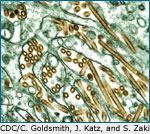2005 Stories
Evolution and the avian flu
The warnings are dire. The economic cost for developed countries alone is estimated at 550 billion dollars, and the projected worldwide death toll ranges between 2 million and 150 million people. The very real specter behind these warnings is, of course, avian flu. As the virus spreads through bird populations, governments have heeded the warnings of health officials and begun to cull infected flocks. More than 150 million birds have been killed so far, with further control efforts looming. However, less than 200 human cases of avian flu have been identified thus far. Why the global concern over localized outbreaks? Currently, the virus can only spread bird-to-bird and, in rare instances, bird-to-human — but biologists warn that the virus could easily “change” to pass from human to human, sparking a deadly, global pandemic.
Read more »“Superweed” discovered in Britain?
Environmentalists raised an outcry when the British Centre for Ecology and Hydrology announced the discovery of what has been termed a “superweed” in July of 2005. The single wild mustard plant achieved superweed status in the minds of some when it proved resistant to a powerful weed killer. Scientists discovered the plant in a field that had been used in trials of genetically-modified (GM) oilseed rape, a group of plants which includes those used to produce canola oil. Environmental groups warn that this discovery augurs serious agricultural and environmental repercussions if genetically-modified oilseed rape were to be grown commercially in the UK.
Read more »Livestock kick a drug habit
“Just say no to drugs” was the message sent to chicken farmers in July of 2005 when the FDA banned the use of the antibiotic Baytril in poultry production. Citing concerns for human health, the FDA will no longer allow poultry producers to give their chickens, turkeys, and ducks Baytril-laced water to treat and prevent respiratory infections in the birds. That move reinforced the actions of McDonald’s, Wendy’s, and other fast food giants that have, in recent years, refused to buy chicken treated with Baytril and other selected drugs. Even the pork industry is getting in on the act. In August, Smithfield Foods Inc., the company likely to have supplied that glazed ham for your Sunday supper, announced that it would stop treating its pigs with selected antibiotics for growth-promotion purposes.
Read more »


